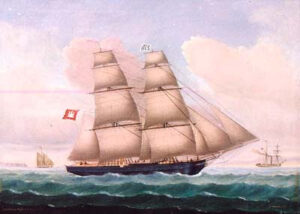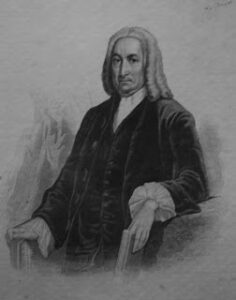Six Degrees of Doctor Graeme: Did Your Ancestors Immigrate through the Port of Philadelphia?
Did your ancestors immigrate through the Port of Philadelphia in the 1700s? If so, they may have crossed paths with Dr. Graeme! As both a Justice of the Pennsylvania Supreme Court from 1731 through at least 1750, and the Port Physician for the Port of Philadelphia from 1727-1741, Dr. Graeme encountered thousands of immigrants. As Port Physician he determined whether or not individuals were healthy enough to disembark from the ship and take up residence in Pennsylvania; and as Justice of the Supreme Court, he ruled on whether or not they could become naturalized citizens with all of the rights and privileges of natural-born citizens of the Crown.

German emigration into Pennsylvania is particularly well documented and the classic source is Pennsylvania German Pioneers by Ralph B. Strassburger and William J. Hinke. This 3-volume set and alphabetical index is available at large genealogical libraries, but if you’re patient, persistent, or know the ship name and/or approximate date your ancestor arrived, you may be able to locate them online here. There are up to three lists, called List “A” or the Captain’s List, List “B” or the Oath of Allegiance List, and List “C” or the Oath of Abjuration List. The Captain’s List is generally the most complete and usually includes all of the passengers on the ship, although sometimes just lists the men. If you can find your ancestor on this list during the time he served as Port Physician, often you will see Dr. Thomas Graeme’s name at the end as the examining doctor who cleared the ship for debarkation. The Oath of Allegiance List was generally made within a day or so of the ship’s landing – all males ages 16 and over were supposed to go to the Courthouse and take an Oath of Allegiance to the King of England – so this list will include all males who went and took this Oath. This law requiring the Oath of Allegiance was actually enacted in Keith’s time: at a September 17, 1717 meeting Keith noted that foreigners from Germany were settling in Pennsylvania without any certificates demonstrating their identity, origin or intention, so he and the provincial Council ordered that those aliens take the following oath of allegiance:
“We the subscribers, natives and late inhabitants of the Palatinate upon the Rhine and places adjacent, having transported ourselves into this Province of Pennsylvania, a colony subject to the Crown of Great Britain, in hopes and expectation of finding a retreat and peaceable settlement therein: Do solemnly promise and engage that we will be faithful and bear true allegiance to his present Majesty King George II, and his successors, and will be faithful to the Proprietors of this Province; and that we will demean ourselves peaceably to all his said Majesty’s subjects, and strictly observe and conform to the laws of England and of this Province to the utmost of our power and best of our understanding.”

In 1740 Parliament passed the Plantation Act to govern the naturalization process in the colonies and encourage immigration by allowing immigrants the same rights and abilities to engage in business as natural-born citizens. In order to be naturalized, petitioners had to have resided in America for seven years without leaving the country for more than two months at any given stretch and provide proof that they had taken the Sacrament in a Protestant church within the three months preceding their appearance in court (exceptions were made for Quakers and those of the Jewish faith, but specifically not for Catholics). Dr. Graeme was one of the Justices in front of whom those seeking naturalization appeared. If your ancestors were naturalized in Philadelphia between 1740 and 1773 you may be able to find them from 1740-1759 here, 1760-1763 here, or 1764-1773 here although Dr. Graeme was only one of the presiding judges through about 1750.

